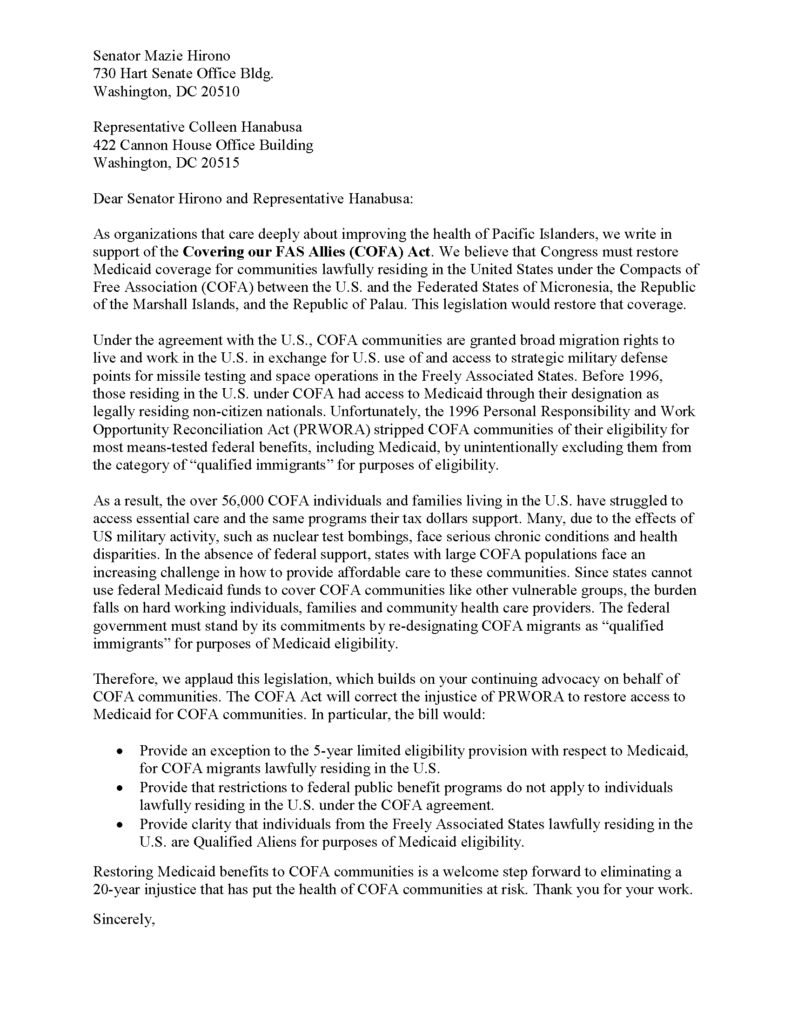COFA Migrants and Our National Security
Since 1986, the Compacts of Free Association (COFA) have defined the relationship between the United States and the independent governments of the Freely Associated States (FAS) including: the Republic of the Marshall Islands, the Federated States of Micronesia and the Republic of Palau. Under the Compact, in exchange for permitting the U.S. exclusive use and military strategic positioning in the Pacific, the U.S. provides grants to fund education, health care, and infrastructure in the FAS. Maintaining good relationships with the FAS is imperative to our national security as other countries seek to grow their influence in the Pacific region.
The Compacts also permit citizens of the FAS broad migration privileges to the U.S. and its territories. Known collectively as “COFA migrants” when they enter the U.S., the Compacts allow citizens of the FAS to apply for admission to the U.S. as “non-immigrants” and without visa requirements. Currently there are at least 56,000 migrants from the COFA nations legally residing, working and studying in the U.S. These COFA migrants pay taxes and play a role in driving our economy, but are not eligible for many of the programs that their tax dollars support.
COFA Migrants Were Formerly Eligible for Federal Health Programs
In 1996, the Personal Responsibility and Work Opportunity Reconciliation Act (PRWORA), commonly referred to as welfare reform, changed the categories of persons eligible for certain federal safety-net programs including Medicaid and the Children’s Health Insurance Program (CHIP). As a result, COFA migrants were stripped of their ability to qualify for these programs. In the aftermath of PRWORA, some states continued to provide health care services to COFA migrants using their own funds, recognizing the contributions and health needs of COFA migrant populations in their states. Regrettably, many COFA Migrants suffer from chronic diseases and health conditions that can be linked to the medical effects of U.S. nuclear testing in the region. The current fiscal crisis, however, has forced many states to reduce funding for these efforts.
Coverage Under the Affordable Care Act is Limited
COFA migrants are subject to the individual mandate, which requires nearly all citizens and lawfully present immigrants to have minimum essential health coverage or pay a penalty. Although the Affordable Care Act (ACA) provides greater access to low-cost insurance plans through the newly created health insurance Marketplace, many COFA migrants still struggle to afford the new plans even with subsidies and are barred from participating in Medicaid regardless of income or length of time in the U.S. The lack of affordable coverage options is becoming increasingly troublesome as more COFA migrants move out of the Compact designated impact jurisdictions of Guam, the Commonwealth of the Northern Mariana Islands (CNMI), American Samoa, and Hawaii. Nine additional states currently have COFA migrant populations exceeding 1,000: California, Washington, Oregon, Utah, Oklahoma, Florida, Arkansas, Missouri and Arizona.
Congressional Efforts to Reinstate Coverage
Since 2001, nineteen bills have been introduced to reinstate COFA migrant eligibility for Medicaid. In the 113th Congress, Congresswoman Hanabusa introduced H.R.912, the Restoring Medicaid for Compact of Free Association Migrants Act of 2013. The Compacts strengthened our national security by securing exclusive access to important Pacific waters. Reinstating Medicaid eligibility would support state efforts to address federal responsibilities under the Compacts.

